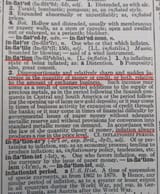Language has gender, people do not
boy.jpg
md5: dd28e869... 🔍

boy: A gendered word meaning a male human infant/child
man: A gendered word meaning a male human adult
When I was a child, I spoke as a child, I understood as a child, I thought as a child; but when I became a man, I put away childish things.
Put away your childish things, anon. Be a man.
man: A gendered word meaning a male human adult
When I was a child, I spoke as a child, I understood as a child, I thought as a child; but when I became a man, I put away childish things.
Put away your childish things, anon. Be a man.




